八年级英语Unit1 where did you go on vacation 教案
- 格式:doc
- 大小:80.00 KB
- 文档页数:10
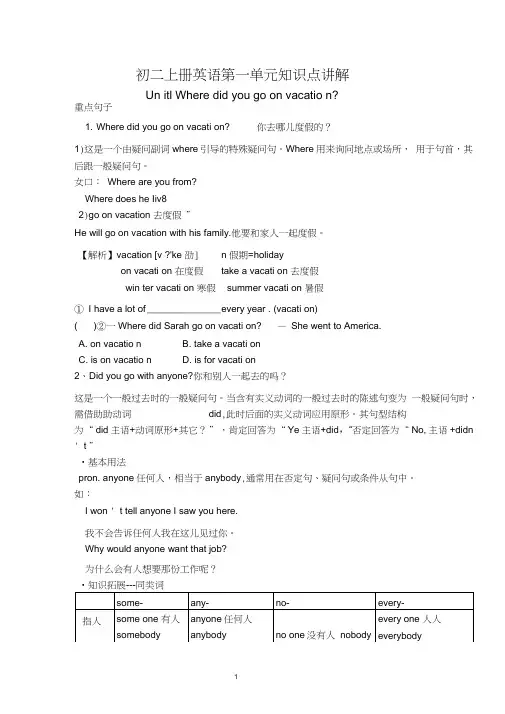
初二上册英语第一单元知识点讲解Un itl Where did you go on vacatio n?重点句子1. Where did you go on vacati on? 你去哪儿度假的?1)这是一个由疑问副词where引导的特殊疑问句。
Where用来询问地点或场所,用于句首,其后跟一般疑问句。
女口:Where are you from?Where does he Iiv82)go on vacation 去度假”He will go on vacation with his family.他要和家人一起度假。
【解析】vacation [v ?'ke 劭] n 假期=holidayon vacati on 在度假take a vacati on 去度假win ter vacati on 寒假summer vacati on 暑假① I have a lot of ______________ e very year . (vacati on)( )②一Where did Sarah go on vacati on? —She went to America.A. on vacatio nB. take a vacati onC. is on vacatio nD. is for vacati on2、Did you go with anyone?你和别人一起去的吗?这是一个一般过去时的一般疑问句。
当含有实义动词的一般过去时的陈述句变为一般疑问句时,需借助助动词did,此时后面的实义动词应用原形。
其句型结构为“ did主语+动词原形+其它?”,肯定回答为“ Ye主语+did,”否定回答为“ No, 主语+didn ' t ”•基本用法pron. anyone任何人,相当于anybody,通常用在否定句、疑问句或条件从句中。
如:I won ' t tell anyone I saw you here.我不会告诉任何人我在这儿见过你。
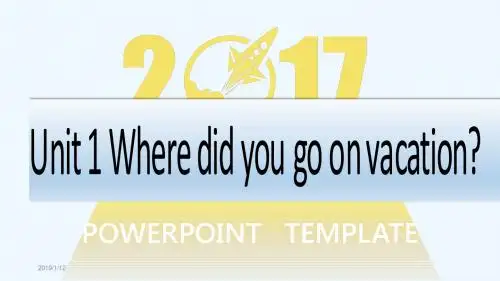
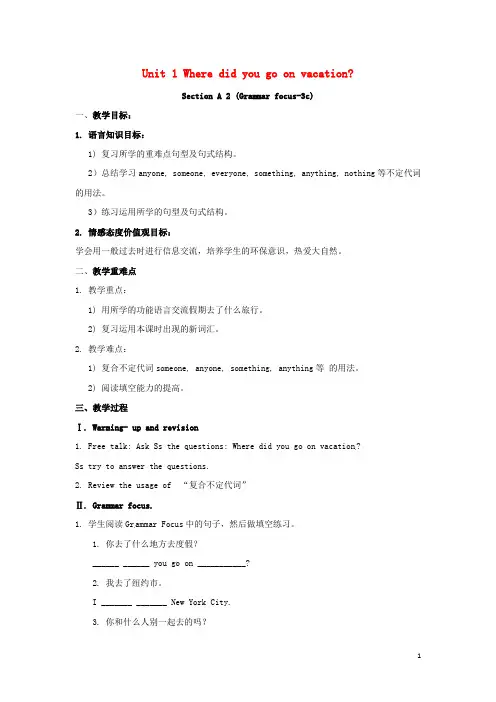
Unit 1 Where did you go on vacation?Section A 2 (Grammar focus-3c)一、教学目标:1. 语言知识目标:1) 复习所学的重难点句型及句式结构。
2)总结学习anyone, someone, everyone, something, anything, nothing等不定代词的用法。
3)练习运用所学的句型及句式结构。
2. 情感态度价值观目标:学会用一般过去时进行信息交流,培养学生的环保意识,热爱大自然。
二、教学重难点1. 教学重点:1) 用所学的功能语言交流假期去了什么旅行。
2) 复习运用本课时出现的新词汇。
2. 教学难点:1) 复合不定代词someone, anyone, something, anything等的用法。
2) 阅读填空能力的提高。
三、教学过程Ⅰ. Warming- up and revision1. Free talk: Ask Ss the questions: Where did you go on vacation?Ss try to answer the questions.2. Review the usage of “复合不定代词”Ⅱ. Grammar focus.1. 学生阅读Gr ammar Focus中的句子,然后做填空练习。
1. 你去了什么地方去度假?______ ______ you go on ___________?2. 我去了纽约市。
I _______ _______ New York City.3. 你和什么人别一起去的吗?______ ______ go out with ________?4. 不,没有别人在这儿。
每个人都在度假。
No. ____ ______ was here.______ was on _________.5. 你买了什么特别的东西了吗?_____ you buy ________ _______?6. 是的,我为我爸爸买了些东西。
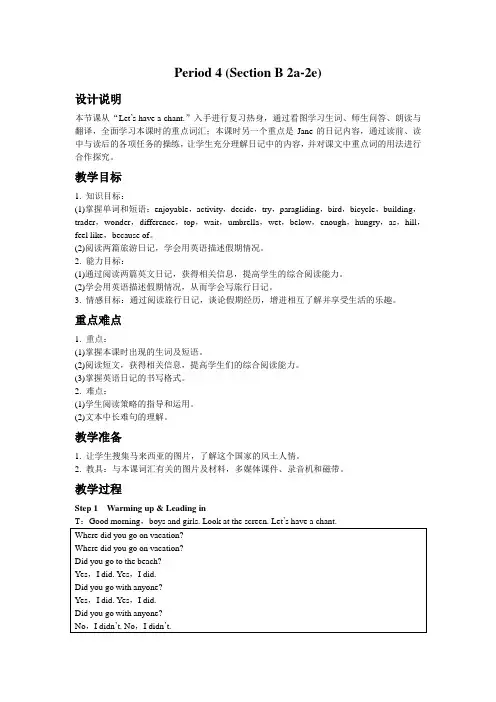
Period 4 (Section B 2a-2e)设计说明本节课从“Let’s have a chant.”入手进行复习热身,通过看图学习生词、师生问答、朗读与翻译,全面学习本课时的重点词汇;本课时另一个重点是Jane的日记内容,通过读前、读中与读后的各项任务的操练,让学生充分理解日记中的内容,并对课文中重点词的用法进行合作探究。
教学目标1. 知识目标:(1)掌握单词和短语:enjoyable,activity,decide,try,paragliding,bird,bicycle,building,trader,wonder,difference,top,wait,umbrella,wet,below,enough,hungry,as,hill,feel like,because of。
(2)阅读两篇旅游日记,学会用英语描述假期情况。
2. 能力目标:(1)通过阅读两篇英文日记,获得相关信息,提高学生的综合阅读能力。
(2)学会用英语描述假期情况,从而学会写旅行日记。
3. 情感目标:通过阅读旅行日记,谈论假期经历,增进相互了解并享受生活的乐趣。
重点难点1. 重点:(1)掌握本课时出现的生词及短语。
(2)阅读短文,获得相关信息,提高学生们的综合阅读能力。
(3)掌握英语日记的书写格式。
2. 难点:(1)学生阅读策略的指导和运用。
(2)文本中长难句的理解。
教学准备1. 让学生搜集马来西亚的图片,了解这个国家的风土人情。
2. 教具:与本课词汇有关的图片及材料,多媒体课件、录音机和磁带。
教学过程Step 1Warming up & Leading inStep 2PresentationT:Look at the pictures. Let’s learn the new words. What’s this?S1:It’s a bicycle. (板书bicycle)T:Do you usually go to school by bicycle?S1:Yes,I do.T:In Picture 2,what are these?S2:They’re umbrellas. (板书umbrella)T:What’s he doing?S3:He’s trying paragliding. (板书try paragliding)T:Is he flying like a bird? (板书bird)S3:Yes,he is....Step 3Practice the new words1. Read the new words after the tape.2. Read and translate the following words and phrases into Chinese.activity 活动decide 决定;选定umbrella 伞;雨伞bird 鸟building 建筑物;房子trader 商人wonder 想知道;琢磨difference 差别;差异because of 因为top 顶部;表面wait 等待;等候wet 湿的;潮湿的;下雨的bicycle 自行车;脚踏车hungry 饥饿的as 像……一样;如同hill 小山;山丘try 尝试;设法;努力paragliding 滑翔伞运动enjoyable有乐趣的;令人愉快的feel like 给……的感觉;感受到below在……下面;到……下面enough 足够的(地);充足的(地);充分的(地)Step 4Reading1. Before readingTask 12a 1. Discuss the two questions with your partner.(1)What do people usually do on vacation?(2)What activities do you find enjoyable?2. Give students some possible answers:People usually go to some places of interest on vacation.I find fishing enjoyable.3. Students discuss the two questions. Write down their answers. Let several groups report their answers.Task 2T:Today I will show some pictures about Malaysia to let you know more about it.And show some exciting and interesting videos to you about paragliding. Let’s know about it.2. While readingT:Are you excited? Do you want to try paragliding? Now we’ll learn Jane’s diary entries about her vacation. She went to Penang in Malaysia. She went to the beach and tried paragliding. Now,let’s know about her vacation.Task 12b Read Jane’s diary entries. Answer the questions:Did Jane have a good time on Monday? What about on Tuesday?Check the answers and find out relative sentences.Answers:Yes,she did. Jane didn’t have a good time on Tuesday.Task 22c Read them again. Fill in the chart.Answers will vary.Task 3(1)Read the diary entries carefully,and fill in the blanks.Jane went to Penang in Malaysia. She went with her family. The weather was sunny and hot on Monday,so they went paragliding on the beach. In the afternoon,they rode bicycles to Georgetown. But the next day was not as good. Jane and her father went to Penang Hill but the weather became bad and it started to rain. They waited a long time for the train and they were wet and cold because they forgot to bring an umbrella. And that was not all! They didn’t bring enough money with them,so they only had one bowl of rice and some fish. But it tasted great!(2)Retell the text.Step 5Cooperative inquiryGet the class to read the following sentences and sum up.①It was sunny and hot,so we decided to go to the beach near our hotel.My father and I decided to go to Penang Hill today.We wanted to walk up to the top,but then it started raining a little so we decided to take the train.②I felt like I was a bird. =I felt like a bird.I feel like eating dumplings for dinner tonight.③And because of the bad weather,we couldn’t see anything below.=And because the weather was bad,we couldn’t see anything below.Lisa didn’t go to school because of her cold (感冒).=Lisa didn’t go to school because she had a cold.④My father didn’t bring enough money,so we only had one bowl of rice and some fish.Linda is old enough to go to school this year.a. decide+to do sth. 意为“决定做某事”。
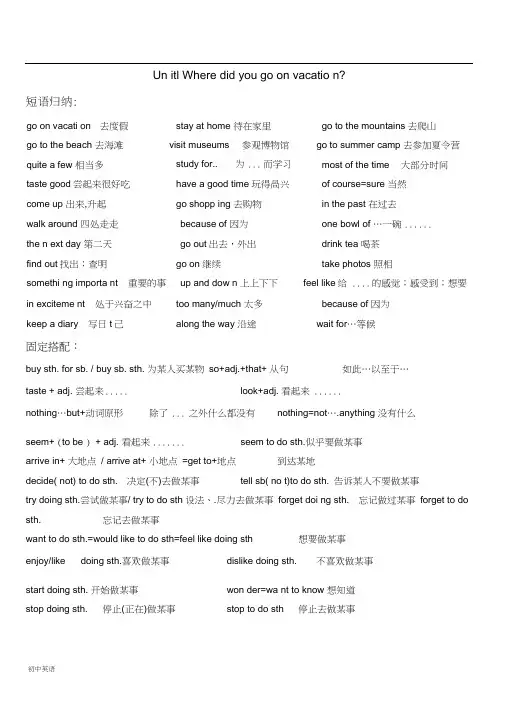
Un itl Where did you go on vacatio n?短语归纳:go on vacati on 去度假stay at home 待在家里go to the mountains 去爬山go to the beach 去海滩visit museums 参观博物馆go to summer camp 去参加夏令营quite a few 相当多study for.. 为... 而学习most of the time 大部分时间taste good尝起来很好吃have a good time 玩得咼兴of course=sure 当然come up 出来,升起go shopp ing 去购物in the past 在过去walk around 四处走走because of 因为one bowl of …一碗......the n ext day 第二天go out出去,外出drink tea 喝茶find out找出;查明go on继续take photos 照相somethi ng importa nt 重要的事up and dow n 上上下下feel like给 .... 的感觉;感受到;想要in exciteme nt 处于兴奋之中too many/much 太多because of 因为keep a diary 写日t己along the way 沿途wait for…等候固定搭配:buy sth. for sb. / buy sb. sth. 为某人买某物so+adj.+that+ 从句如此…以至于…taste + adj. 尝起来..... look+adj. 看起来......nothing…but+动词原形除了... 之外什么都没有nothing=not….anything 没有什么seem+ (to be ) + adj. 看起来....... seem to do sth.似乎要做某事arrive in+ 大地点/ arrive at+ 小地点=get to+地点到达某地decide( not) to do sth. 决定(不)去做某事tell sb( no t)to do sth. 告诉某人不要做某事try doing sth.尝试做某事/ try to do sth 设法、.尽力去做某事forget doi ng sth. 忘记做过某事forget to do sth. 忘记去做某事want to do sth.=would like to do sth=feel like doing sth 想要做某事enjoy/like doing sth.喜欢做某事dislike doing sth. 不喜欢做某事start doing sth. 开始做某事won der=wa nt to know 想知道stop doing sth. 停止(正在)做某事stop to do sth 停止去做某事keep doi ng sth.继续做某事Why n ot do. sth.? 为什么不做.... 呢?enjoy on eself =have a good/great time=have fun过得愉快,玩的开心词性转换:三.重点句子豈1< Where did you go on vacation? 你去哪儿度假的? 2. Long time no see. 好久不见。
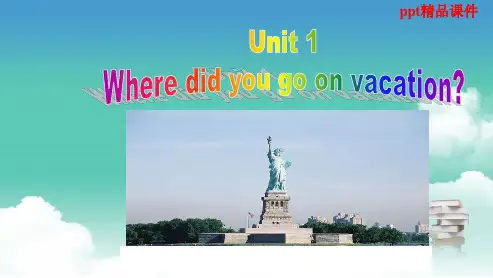
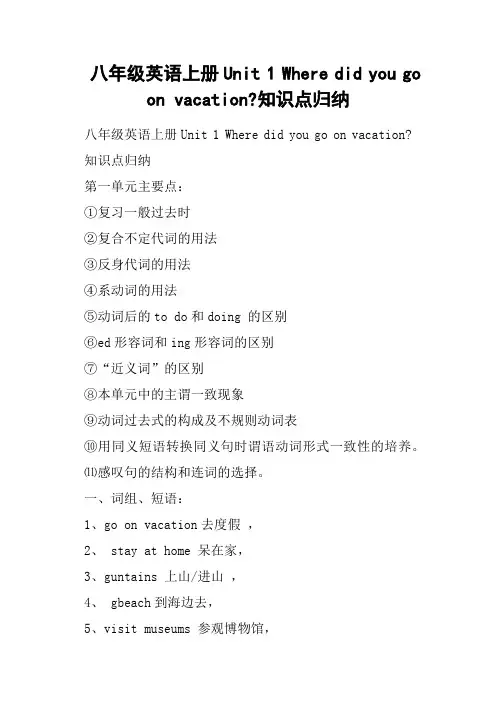
八年级英语上册Unit 1 Where did you go on vacation?知识点归纳八年级英语上册Unit 1 Where did you go on vacation?知识点归纳第一单元主要点:①复习一般过去时②复合不定代词的用法③反身代词的用法④系动词的用法⑤动词后的to do和doing 的区别⑥ed形容词和ing形容词的区别⑦“近义词”的区别⑧本单元中的主谓一致现象⑨动词过去式的构成及不规则动词表⑩用同义短语转换同义句时谓语动词形式一致性的培养。
⑾感叹句的结构和连词的选择。
一、词组、短语:1、go on vacation去度假,2、 stay at home 呆在家,3、guntains 上山/进山,4、 gbeach到海边去,5、visit museums 参观博物馆,6、go to summer camp 去夏令营,7、 quite a few 相当多,8、study for为……学习,9、go out 出去,10、大部分时间/绝大多数时间,11、taste good 尝起来味道好,12、have a good time玩的开心,13、of course当然可以,14、feel like感觉像……/想要,15、 gg购物,16、ast 在过去,17、walk around绕……走,18、too many 太多(可数名词前面),19、because of 因为,20、one bowl of 一碗……,21、find out 查出来/发现,22、go on继续,23、ta照相,24、g important重要的事情,25、up and down上上下下,26、come up出来二、重要句子(语法):Where did you go on vacation?你到哪里去度假了?I went to New我去了纽约城Did you go out with anyone? 你出去带人吗?No, No one waveryone was on vacation.不,没有人在这儿。
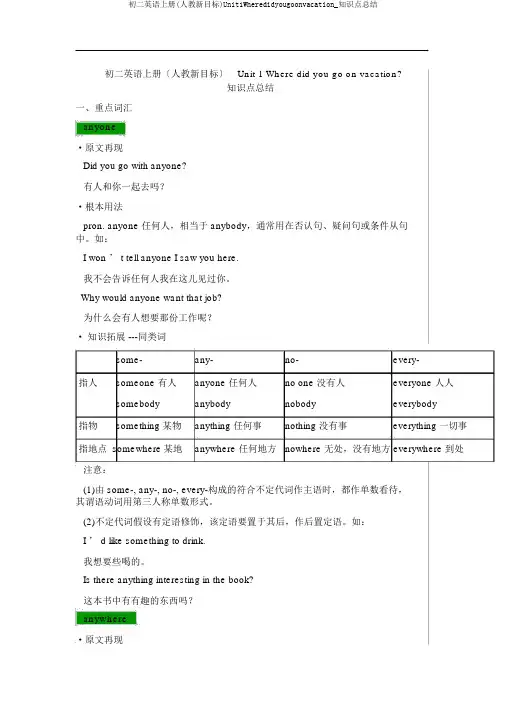
初二英语上册〔人教新目标〕Unit 1 Where did you go on vacation?知识点总结一、重点词汇anyone·原文再现Did you go with anyone?有人和你一起去吗?·根本用法pron. anyone 任何人,相当于 anybody,通常用在否认句、疑问句或条件从句中。
如:I won ’ t tell anyone I saw you here.我不会告诉任何人我在这儿见过你。
Why would anyone want that job?为什么会有人想要那份工作呢?·知识拓展 ---同类词some-any-no-every-指人someone 有人anyone 任何人no one 没有人everyone 人人somebody anybody nobody everybody指物something 某物anything 任何事nothing 没有事everything 一切事指地点 somewhere某地anywhere 任何地方nowhere 无处,没有地方 everywhere 到处注意:(1)由 some-, any-, no-, every-构成的符合不定代词作主语时,都作单数看待,其谓语动词用第三人称单数形式。
(2)不定代词假设有定语修饰,该定语要置于其后,作后置定语。
如:I ’ d like something to drink.我想要些喝的。
Is there anything interesting in the book?这本书中有有趣的东西吗?anywhere·原文再现Oh,did you go anywhere interesting?哦,你去过某个有趣的地方吗?·根本用法adv./pron. anywhere 什么地方,任何地方,常用在否认句或疑问句中。
肯定句中常用 somewhere,其修饰词也常常放在其后面。
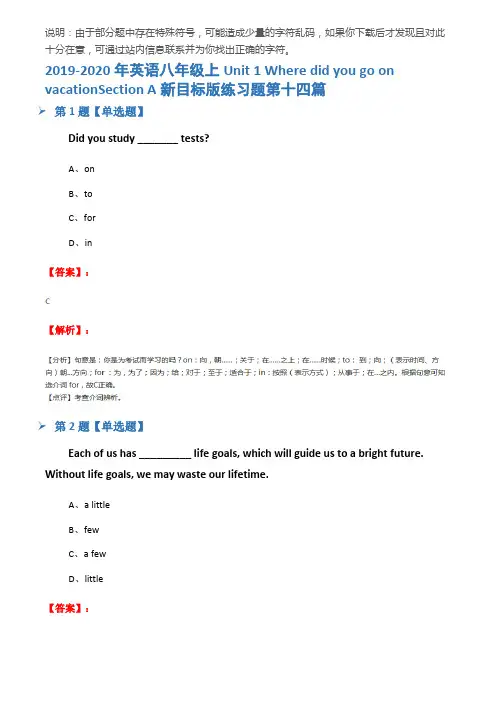
2019-2020年英语八年级上Unit 1 Where did you go on vacationSection A新目标版练习题第十四篇➢第1题【单选题】Did you study _______ tests?A、onB、toC、forD、in【答案】:【解析】:➢第2题【单选题】Each of us has _________ life goals, which will guide us to a bright future. Without life goals, we may waste our lifetime.A、a littleB、fewC、a fewD、little【答案】:【解析】:➢第3题【单选题】—__________?—It was nice and interesting.A、Where did you go on vacationB、When did you go on vacationC、How was your vacationD、Did you enjoy your vacation【答案】:【解析】:➢第4题【单选题】We _______ eleven lessons last term.A、learnB、learnedC、learnsD、learning【答案】:【解析】:➢第5题【单选题】We _______ the Great Wall three days ago.A、didn"t went toB、didn"t go toC、weren"t go toD、go to【答案】:【解析】:➢第6题【单选题】The old man is well because he often __________.A、exercisesB、drinksC、sleepsD、play【答案】:【解析】:➢第7题【单选题】I ______ at school now, but I ______ at home an hour ago.A、am, amB、was, wasC、am, wereD、am, was【答案】:【解析】:➢第8题【单选题】There is _______ with the watch. It works well.A、nothing wrongB、wrong nothingC、something wrongD、wrong something【答案】:【解析】:➢第9题【填空题】I usually ______ (watch) a cartoon on Saturday.【答案】:【解析】:➢第10题【填空题】Can you find the ______ (different) between this box and that box? 【答案】:【解析】:➢第11题【填空题】Do you want to meet that ______ (interview)?【答案】:【解析】:➢第12题【填空题】______ you ______ (visit) your grandparents last Spring Festival? 【答案】:【解析】:➢第13题【填空题】— Did he ______ (fly) a kite on Sunday?— Yes, he ______.【答案】:➢第14题【填空题】You should look after your ______(healthy).【答案】:【解析】:➢第15题【填空题】It ______ (be) Ben"s birthday last Friday.【答案】:【解析】:➢第16题【填空题】The students often ______ (draw) some pictures in the art room. 【答案】:➢第17题【填空题】根据短文理解,在空格处填写适当的单词。
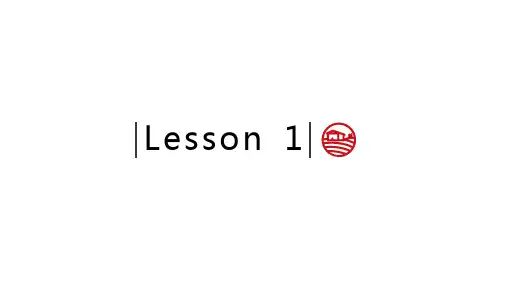
八年级上Unit 1 Where did you go on vacation? 一.Phrases1. go on vacation去度假2. stay at home待在家里3. go to the mountains去爬山4. go to the beach去海滩5. visit museums 参观博物馆6. go to summer camp去参观夏令营7. quite a few相当多8. study for为……而学习9. go out出去10. most of the time大部分时间11. taste good尝起来很好吃12. have a good time玩得高兴13. of course当然14. feel like给……的感觉;感受到15. go shopping去购物16. in the past在过去17. walk around四处走走18. because of因为19. one bowl of… 一碗……20. the next day第二天21. drink tea喝茶22. find out找出;查明23. go on继续24. something important重要的事25. up and down上上下下26. come up出来27. take photos照相二.句型集萃1. buy sth. for sb. / buy sb. sth. 为某人买某物2. taste + adj. 尝起来……3. seem+(to be)+ adj. 看起来……4. keep doing sth. 继续做某事5. arrive in+大地点/ arrive at+小地点到达某地6. tell sb. (not) to do sth. 告诉某人(不要)做某事7. try doing sth. 尝试做某事/ try to do sth. 尽力去做某事8. decide to do sth. 决定去做某事9. forget doing sth. 忘记做过某事/10. forget to do sth. 忘记做某事11. enjoy doing sth. 喜欢做某事12. want to do sth. 想去做某事13. stop doing sth. 停止做某事14. dislike doing sth. 不喜欢做某事15. Why not do. sth.? 为什么不做……呢?16. so+ adj.+ that 如此……以至于……17. look +adj. 看起来……18. start doing sth. 开始做某事练习I. 用所给动词的适当形式填空1. Tom and Mary _______ (come) to China last month.2. My daughter ________ (not go) to school yesterday.3. —_______ she _________ (practice) her guitar yesterday?—No, she _________.4. There _______ (be) three trees around my house last year.5. —What _______ you _______ (do) last weekend?—I _________ (study) math on Saturday.II. 短语翻译1. 去度假__________________2. 呆在家________________3. 去沙滩 __________________4. 夏令营 _________________5. 相当多_________________6. 为……而学习________________7. 出去 ________________ 8. 玩的高兴_______________ 9. 当然_________________10. 在过去________________ 11. 决定做某事__________________ 12. 因为_______________13. 一碗 _________________ 14. 到达_________________ 15. 足够的钱___________________III. 翻译句子1. 昨天,我没有足够的钱。
I______ _______ _________ money yesterday. (enough)2. 我感觉我像一只小鸟。
(feel like )I ______ ______ I was ______ _____.3. 我决定去海滩。
I _______ _______ ________ to the beach.(decide)4. 我不喜欢玩电脑游戏.。
(dislike) I_______ _______ computer games.5. 由于坏天气,我看不到下边任何东西。
__________ ______ bad weather, we couldn’t see __________ _________.6. 我去会见了有趣的人。
I met ________ _________.7. 食物怎么样呢? _______ ________ the food?8. 每个人都玩得开心吗?Did everyone ________ ________ _______ ________?9. 你为什么不为你自己买些东西呢?_______ ________ _______ buy anything for yourself?10. 我想知道过去这的生活是什么样子的?I wonder _______ _______ _______ _______ here in the past.三.Language Points1. Where did you go on vacation? 你去哪里度假了?(1) 这是有疑问副词where引导的特殊疑问句,where用来询问地点和场所,放在句首。
a. _____ do you _____ ______? 你从哪里来?b. _____does he______? 他住在哪里?(2) go on vacation意为“去度假”。
I want ______ ______ ______ ______in Hainan this winter. 今年冬天我想去海南度假。
2. visited my uncle 看望了我的叔叔visit是及物动词,意为“拜访;探望”,后接表示人的名词或代词。
visit还可以意为“参观;游览”,后接表示地点的名词。
a. I visited my grandmother last week. 上周我去______了我的外婆。
b. Do you want to visit Shanghai? 你想______上海吗?拓展:visitor意为“参观者;游客”。
e.g.: These visitors come from America. ___________________________3. buy anything special 买特别的东西。
(1) buy及物动词,意为“买;购买”。
其过去式为________。
拓展:buy sth. for sb.=buy sb. sth. 意为“给某人买某物”。
My uncle________ _______a bike.= My uncle________ ________ ________ for me.(2) anything不定代词,意为“某事;某件东西”,主要用于疑问句或否定句中。
a. Do you want anything from me?b. I can’t say anything about it.(3) anything special表示“特别的东西”,形容词修饰不定代词时后置。
a. Is there_________ ________in this book? 这本书里有新的内容吗?4. We took quite a few photos there. 我们在那里拍了不少照片。
take photos 意为“照相;拍照”。
e.g.: We______ ______on the Great Wall. 我们在长城上照了相。
辨析:quite a few与quite a littlequite a few 意为“很多,不少”,修饰可数名词复数;quite a little 意为“很多,不少”,修饰不可数名词。
a. He stays here for _______ _______ _______days.b. There is _______ _______ _______water in the bottle.5. Did everyone have a good time? 大家都玩得很开心吗?have a good time = enjoy oneself = have fun 玩得开心(+ doing)We had a good time visiting the Great Wall. = We enjoyed ourselves visiting the Great Wall.= We had fun visiting the Great Wall.6. How did you like it? 你觉得它怎么样?How do/did you like…? 意为“你觉得……怎么样?”,用来询问对方的观点或看法,相当于What do you think of…?How do you like your new job? = _____ _____ _____ _____ your new job?7. I went to a friend’s farm in the countryside with my family.我和家人一起去了乡下一个朋友的农场。
a friend’s farm是名词所有格形式。
一般情况下,表示“有生命的人或物”的名词后面加’s,表示所属关系。
The red bike is Alice’s.那辆红色的自行车是爱丽斯的。
拓展:名词所有格的构成:(1) 名词词尾加’s,复数名词词尾没有s,也要加’sthe girl’s pen女孩的钢笔;women’s shoes女鞋;on Children’s Day(2) 复数名词以s结尾的只加’the students’ reading room学生阅览室;Teacher s’ Day教师节(3) 如果两个名词并列,并且分别有’s,则表示“分别有”;只后一个名词有一个’s,则表示“共有”:John’s and Kate’s rooms. 约翰和凯特(各自)的房间。